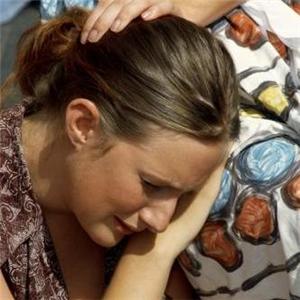February 10th, 2010 by Edwin Leap, M.D. in Better Health Network, Opinion, True Stories
1 Comment »

 I’m becoming an amateur archeologist. The hilltop where we live is strewn with arrowheads and bits of Native American pottery shards. I have slowly, surely, trained my eye to find them. There is little flint here; so most of the pieces I find were made of quartz. (Hard to work with, but remarkably beautiful and almost always a brilliant white.)
I’m becoming an amateur archeologist. The hilltop where we live is strewn with arrowheads and bits of Native American pottery shards. I have slowly, surely, trained my eye to find them. There is little flint here; so most of the pieces I find were made of quartz. (Hard to work with, but remarkably beautiful and almost always a brilliant white.)
My kids and I walk the red-clay paths and look down for bits of stone protruding up, especially after a good, soaking rain. Elijah, my youngest boy, was the first to find one. ‘Is that an arrowhead, Papa?’ ‘Yep, good eye son!’ He had found what was probably the point of an atlatl (a kind of mix between arrow and spear).
We look for rocks that seem shaped by human hands. That’s the ticket; look for something that seems to suggest a purpose or a history. Things with no shape, no marks from being worked, are probably not worth our time. Read more »
*This blog post was originally published at edwinleap.com*
February 7th, 2010 by GruntDoc in Better Health Network, Opinion
1 Comment »

Emergency Medicine News:
February 2010 – Volume 32 – Issue 2 – p 5, 24, 25, 26
Residents training in large urban centers typically see more than 200 patients a day. They have access to all subspecialty care, typically available 24 hours a day. Residents have around-the-clock access to angioplasty, interventional radiology, hand surgeons, neurosurgeons, and plastic surgeons. Most practice emergency medicine with cardiologists and neurologists in the building or a short phone call away. Decision-making is shared, and occurs with a relative surplus of information and opinions and in a milieu of shared risk.
In reality, though, these very large and highly-specialized EDs with Level I trauma comprise less than five percent of U.S. EDs, according to the American College of Surgeons. Read more »
*This blog post was originally published at GruntDoc*
February 5th, 2010 by Shadowfax in Better Health Network, True Stories
3 Comments »

 Anyone who has flown long-distance flights has heard the call: “If there is a doctor on board, please identify yourself to a flight attendant.” But it’s impossible to understand how that call induces the urge to flee to the lavatory and hide unless you are one of those unfortunate few who are on the hook, which is to say that you are qualified to respond, but you really really don’t want to.
Anyone who has flown long-distance flights has heard the call: “If there is a doctor on board, please identify yourself to a flight attendant.” But it’s impossible to understand how that call induces the urge to flee to the lavatory and hide unless you are one of those unfortunate few who are on the hook, which is to say that you are qualified to respond, but you really really don’t want to.
“But Gee,” I can hear you think, “Aren’t you an ER doctor? Isn’t this sort of thing second nature to you? Don’t you revel in the adrenaline and glory?” Well, yes. But. First of all, there is the performance anxiety thing. I’m used to working with a very small audience. In Economy class, there may be 300 people watching me try to do my thing, and I’m just not used to that many people being in the exam room — and I know they are very interested in what’s going on. Read more »
*This blog post was originally published at Movin' Meat*
February 4th, 2010 by Medgadget in Better Health Network, News
1 Comment »

 First Aid Corps, an organization working on helping the public respond to sudden cardiac arrests, has unveiled an iPhone app that can pinpoint the location of the closest automatic external defibrillator (AED) within seconds.
First Aid Corps, an organization working on helping the public respond to sudden cardiac arrests, has unveiled an iPhone app that can pinpoint the location of the closest automatic external defibrillator (AED) within seconds.
Currently the database is just beginning to fill up but First Aid Corps has partnered with The Extraordinaries, a volunteer organization, to have people locate and photograph AED’s in their community.
The app is free and you can download it and get started mapping AED’s and maybe help save someone’s life.
Here’s a promo video for the project:
Demo of the AED Nearby app:
AED Nearby iTunes link…
Flashbacks: AED Location Database Points to Nearest Life Saving Device; Do You Know Where Your AED Is At?
*This blog post was originally published at Medgadget*
February 1st, 2010 by Dr. Val Jones in True Stories
4 Comments »
 A dear friend of mine (let’s call her Amanda) has metastatic breast cancer. She’s far outlived her life expectancy, thanks to advances in targeted chemotherapy, but is beginning to need more medical care. She’s the divorced mom of two teens, with a loving extended family who keeps a close eye on her.
A dear friend of mine (let’s call her Amanda) has metastatic breast cancer. She’s far outlived her life expectancy, thanks to advances in targeted chemotherapy, but is beginning to need more medical care. She’s the divorced mom of two teens, with a loving extended family who keeps a close eye on her.
When Amanda was recently admitted to her local hospital with abdominal pain, a new policy resulted in some unintended consequences. While she was still in the Emergency Department, a nurse came by to ask if Amanda wanted to be an organ donor. The family members – keenly aware of her grave prognosis – assumed that the nurse knew about the cancer, and was asking this question because it had been determined that Amanda was about to die.
Tearful sobs ensued. Amanda’s sister called me the next day to tell me the news. Read more »
 I’m becoming an amateur archeologist. The hilltop where we live is strewn with arrowheads and bits of Native American pottery shards. I have slowly, surely, trained my eye to find them. There is little flint here; so most of the pieces I find were made of quartz. (Hard to work with, but remarkably beautiful and almost always a brilliant white.)
I’m becoming an amateur archeologist. The hilltop where we live is strewn with arrowheads and bits of Native American pottery shards. I have slowly, surely, trained my eye to find them. There is little flint here; so most of the pieces I find were made of quartz. (Hard to work with, but remarkably beautiful and almost always a brilliant white.)






 First Aid Corps, an organization working on helping the public respond to sudden cardiac arrests, has unveiled an iPhone app that can pinpoint the location of the closest automatic external defibrillator (AED) within seconds.
First Aid Corps, an organization working on helping the public respond to sudden cardiac arrests, has unveiled an iPhone app that can pinpoint the location of the closest automatic external defibrillator (AED) within seconds.








